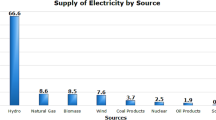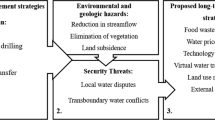Abstract
The hypothesis of a rebound effect as a consequence of water saving investments is taken analogically from the Jevons paradox models in energy economics. The European Commission (EC) alert about the consequences in water stressed regions that are investing heavily in modernization of irrigation networks and systems. This paper reviews the literature, linking water savings with water diversion and water depletion, both from theoretical models and empirical evidence from the published research. In order to increase knowledge of this phenomenon, a new empirical case study is presented based on a survey of 36,000 ha of recently modernized irrigated areas in the Guadalquivir basin (southern Spain). The results of the case study illustrates the conditions that may avoid rebound effect, although the results of the available empirical evidence and the published theoretical research are diverse and lead to contradictory results. Further research is therefore needed to determine the causes and solutions of water saving investment impacts and the possible speculative rebound effect.

Similar content being viewed by others
References
Allen RG, Pereira LS, Raes D, Smith M (1998) Crop evapotranspiration: guidelines for computing crop water requirements. FAO Irrig and Drain Paper 56
Berbel J, Gómez-Limón C (2000) The impact of water-pricing policy in Spain: an analysis of three irrigate areas. Agric Water Manag 43:219–238
Berbel J, Mateos L (2014) Does investment in irrigation technology necessarily generate rebound effects? A simulation analysis based on an agro-economic model. Agric Syst 128:25–34. doi:10.1016/j.agsy.2014.04.002
Berbel J, Martin-Ortega J, Mesa P (2011) A cost-effectiveness analysis of water-saving measures for Water Framework Directive: the case of the Guadalquivir River Basin in Southern Spain. Water Resour Manag 25:623–640. doi:10.1007/S11269-010-9717-6
Berbel J, Kolberg S, Martin-Ortega J (2012) Assessment of the draft hydrological basin plan of the Guadalquivir River Basin (Spain). Int J Water Resour Dev 28(1):43–56. doi:10.1080/07900627.2012.640875
Berbel J, Pedraza V, Giannoccaro G (2013) The trajectory towards basin closure of a European river: Guadalquivir. Int J River Basin Manag 11(1):111–119. doi:10.1080/15715124.2013.768625
Burt CM, Clemmens AJ, Strelkoff TS, Solomon KH, Bliesner RD, Hardy LA, Howell TA, Eisenhauer DE (1997) Irrigation performance measures: efficiency and uniformity. J Irrig Drain Eng 123:423–442
Contor BA, Taylor RG (2013) Why improving irrigation efficiency increases total volume of consumptive use. Irrig Drain 62(3):273–280
Dagnino M, Ward FA (2012) Economics of agricultural water conservation: empirical analysis and policy implications. Int J Water Resour Dev 28(4):577–600. doi:10.1080/07900627.2012.665801
De Fraiture C, Perry C (2002) Why is irrigation water demand inelastic at low price ranges. In Conference on Irrigation Water Policies: Micro and Macro Considerations. pp. 15–17
De Stefano L, Llamas MR (eds) (2012) Water, Agriculture and the Environment in Spain: can we square the circle?, CRC Press
Dinar A, Zilberman D (1991) The economics of resource-conservation, pollution-reduction technology selection: the case of irrigation water. Resource Energy 13(4):323–348
Dumont A, Mayor B, López-Gunn E (2013) Is the rebound effect or jevons paradox a useful concept for better management of water resources? Insights from the irrigation modernisation process in Spain. Aquat Procedia 1:64–76. doi:10.1016/j.aqpro.2013.07.006
EC, European Commission (2000) Water Framework Directive of the European Parliament and of the Council (2000/60/EC). Brussels. http://eur-lex.europa.eu/LexUriServ/LexUriServ.do?uri=CELEX:32000L0060:en:HTML. Accessed 26 Sept 2013
EC, European Commission (2012) A Blueprint to Safeguard Europe’s Water Resources, Brussels. http://ec.europa.eu/environment/water/blueprint/pdf/COM-2012-673final_EN_ACT-cov.pdf. Accessed 10 Oct 2013
EEA, European Environment Agency (2012) Towards efficient use of water resources in Europe. Report No 1/2012. Luxembourg: Office for Official Publications of the European Union. doi:10.2800/95096, http://www.eea.europa.eu/publications/towards-efficient-use-of-water. Accessed 26 Sept 2013
Fernández-García I, Rodríguez-Díaz JA, Camacho-Poyato E, Montesinos P, Berbel J (2014) Effects of modernization and medium term perspectives on water and energy use in irrigation districts. Agric Syst 131, 56-63. doi:10.1016/j.agsy.2014.08.002
García-Garizabal I, Causapé J (2010) Influence of irrigation water management on the quantity and quality of irrigation return flows. J Hydrol 385:36–43
García-Mollá M, Sanchis-Ibor C, Ortega-Reig MV, Avellá-Reus L (2013) Irrigation associations coping with drought: the case of four irrigation districts in eastern Spain. In: Schwabe K, Albiac Murillo J, Connor JD, Hassan RM, Meza González L (eds) Drought in arid and semi-arid regions. Springer, Netherlands, pp 101–122. doi:10.1007/978-94-007-6636-5_6
Gleick PH, Christian-Smith J, Cooley H (2011) Water-use efficiency and productivity: rethinking the basin approach. Water Int 36(7):784–798. doi:10.1080/02508060.2011.631873
Gómez CM, Gutierrez C (2011) Enhancing irrigation efficiency but increasing water use: the Jevons’ Paradox. EAAE 2011, Congress change and uncertainty challenges for agriculture, food and natural resources. Zurich, Switzerland
Gómez-Gómez CM, Pérez-Blanco CD (2014) Simple myths and basic maths about greening irrigation. Water Resour Manag. doi:10.1007/s11269-014-0725-9
Graveline N, Majone B, Van Duinen R, Ansink E (2013) Hydro-economic modeling of water scarcity under global change: an application to the Gállego river basin (Spain). Reg Environ Chang 14:119–132. doi:10.1007/s10113-013-0472-0
Gutierrez-Martin C, Gomez Gomez CM (2011) Assessing irrigation efficiency improvements by using a preference revelation model. Span J Agric Res 9(4):1009–1020. doi:10.5424/sjar/20110904-514-10
Heumesser C, Fuss S, Szolgayová J, Strauss F, Schmid E (2012) Investment in irrigation systems under precipitation uncertainty. Water Resour Manag 26(11):3113–3137
Huffaker R (2008). Conservation potential of agricultural water conservation subsidies. Water Resour Res 44(7). doi:10.1029/2007WR006183
Jackson TM, Khan S, Hafeez M (2010) A comparative analysis of water application and energy consumption at the irrigated field level. Agric Water Manag 97:1477–1485
Lecina S, Isidoro D, Playán E, Aragüés R (2010) Irrigation modernization and water conservation in Spain: the case of Riegos del Alto Aragón. Agric Water Manag 97:1663–1675
López-Baldovín MJ, Gutiérrez C, Berbel J (2006) Multicriteria and multiperiod programming for scenario analysis in Guadalquivir river irrigated farming. J Oper Res Soc 57:499–509. doi:10.1057/palgrave.jors.2602029
López-Gunn E, Mayor B, Dumont A (2012) Implications of the modernization of irrigation systems. In: De Stefano L, Llamas MR (eds.) Water, agriculture and the environment in Spain: can we square the circle? CRC Press, pp 241–256
Lopez-Gunn E, Zorrilla P, Prieto F, Llamas MR (2012) “Lost in translation? Water efficiency in Spanish agriculture”, Agricultural Water Management, 108:83–95
MAPA-Ministry of Food, Agriculture, and Fishery (2001). Plan Nacional de Regadíos. Horizonte 2008. Madrid, Spain (in Spanish)
Martin DL, Watts DG, Gilley JR (1984) Model and production function for irrigation management. J Irrig Drain Eng 110:148–165
Peterson JM, Ding Y (2005) Economic adjustments to groundwater depletion in the High Plains: do water-saving irrigation systems save water? Am J Agric Econ 87(1):147–159
Pfeiffer L, Lin C-YC (2014) Does efficient irrigation technology lead to reduced groundwater extraction?: Empirical evidence. J Environ Econ Manag 67:189–208. doi:10.1016/j.jeem.2013.12.002
Playán E, Mateos L (2006) Modernization and optimization of irrigation systems to increase water productivity. Agric Water Manag 80:100–105
Qureshi ME, Schwabe K, Connor J, Kirby M (2010) Environmental water incentive policy and return flows. Water Resour Res 46(4). doi:10.1029/2008WR007445
Rodríguez Díaz JA, Pérez Urrestarazu L, Camacho Poyato E, Montesinos P (2011) The paradox of irrigation scheme modernization: more efficient water use linked to higher energy demand. Span J Agric Res 9(4):1000–1008
Rodríguez Díaz JA, Pérez Urrestarazu L, Camacho Poyato E, Montesinos P (2012) Modernizing water distribution networks – lessons from the Bembézar MD irrigation district, Spain. Outlook Agric 41(4):229–236
Scheierling SM, Young RA, Cardon GE (2006) Public subsidies for water-conserving irrigation investments: Hydrologic, agronomic, and economic assessment. Water Resour Res 42(3). doi:10.1029/2004WR003809
Seckler D (1996) The new era of water resources management: from “dry” to “wet” water savings. IWMI Research Report 1, International Irrigation Management Institute, Colombo, Sri Lanka
Soto-García M, Martínez-Álvarez V, García-Bastida PA, Alarcón F, Martin-Górriz B (2013) Effect of water scarcity and modernisation on the performance of irrigation districts in south-eastern Spain. Agric Water Manag 124:11–19
Spanish Government (2001) Real Decreto Legislativo 1/2001, de 20 de julio, por el que se aprueba el texto refundido de la Ley de Aguas (in Spanish) BOE-A-2001-14276. Available online: http://www.boe.es/buscar/doc.php?id=BOE-A-2001-14276 Accessed 15 Oct 2013
Törnqvist R, Jarsjö J (2012) Water savings through improved irrigation techniques: basin-scale quantification in semi-arid environments. Water Resour Manag 26(4):949–962. doi:10.1007/s11269-011-9819-9
Ward FA, Pulido-Velazquez M (2008) Water conservation in agriculture can increase water use. Proc Natl Acad Sci 105(47):18215–18220. doi:10.1073/pnas.0805554105
Whittlesey N (2003) Improving irrigation efficiency through technology adoption: when will it conserve water? Dev Water Sci 50:53–62
Author information
Authors and Affiliations
Corresponding author
Additional information
Highlights
The present study analyzes the theoretical and empirical evidence that water saving investments may lead to increased water use and/or consumption.
Some authors suggest that if irrigated land expansion is not constrained, increased water abstractions are likely to occur.
When land expansion is constrained and water rights are controlled, water depletion does not increase.
The results of published research are diverse and have yielded contradictory results regarding the rebound effect as a consequence of water saving investments.
Rights and permissions
About this article
Cite this article
Berbel, J., Gutiérrez-Martín, C., Rodríguez-Díaz, J.A. et al. Literature Review on Rebound Effect of Water Saving Measures and Analysis of a Spanish Case Study. Water Resour Manage 29, 663–678 (2015). https://doi.org/10.1007/s11269-014-0839-0
Received:
Accepted:
Published:
Issue Date:
DOI: https://doi.org/10.1007/s11269-014-0839-0




